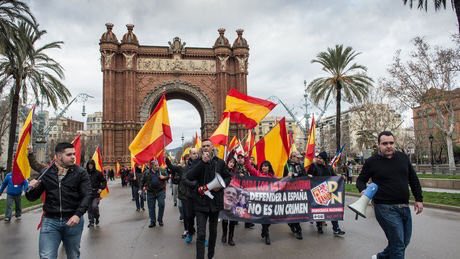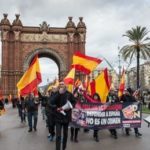- On many occasions, Catalans protest for independence from Spain. Credit: @Falange_Philly.
By: Danielle Meikle
Many regions attempt secession from their country for numerous reasons, with Catalonia being the most recent region that is en-route to secession from Spain.
Secession occurs when a country or region declares their independence from the ruling government; thus, the region creates its own form of government. The most common reason for secession arises from a region having a history of ethnic or racial discrimination, with that region possessing a larger proportion of the racial minority compared to the rest of the country, such as Catalonia. The seceding region may be historically different, speak a different language or dialect, or have religious differences.
Although Barcelona is Spain’s capital city and home to the most of the population, Catalonia, a region located in Spain’s far north-east corner, is also one of the most wealthiest and most commercial regions in Spain, with tourism, manufacturing, chemical, food-processing, and metallurgy, all contributing to its economy.
Catalans have historically been one of the most independent-minded people of Spain due to the oppressive Franco dictatorship which once governed Spain. Under this regime, Catalan identity was suppressed- their autonomy was revoked, and Catalan nationalism and language repressed. However, when Spain became a republic in 1931, Catalonia was soon after given broad autonomy, and has its own parliament and executive branches of government.
According to the Telegraph website, it was not until recently that Catalans desired full independence because of the severe economic downturn that Spain has experienced in the last few years. Many Catalans believe that the region contributes more to the country’s GDP than Madrid, its capital, with little return. Some Catalans accept that their taxes go toward helping the poorer regions; however, their own public services are being underfunded. This issue coupled with the fact that the Spanish central government is blamed for the downturn has caused a rise in separationist ideas.
The reports from the BBC News website indicate that the Catalonia’s government, which was backed by the two major separationist parties, held an informal vote in November 2014, with
80% voting to start the secession. This vote, however, was non-binding and was ruled illegal by the Constitutional Court because it went against the Spanish constitution. Despite this, the separationist parties continue to push for their independence within 18 months. The acting President of Catalonia, Artur Mas, seeks to instate the other services offered by an independent state, such as a diplomatic service, treasury, and armed forces, despite already having substantial autonomy in healthcare, education, and policy-making. However, according BBC News, Catalonia faces much backlash from the national government in Madrid, headed by Prime Minister Mariano Rajoy, who plans to invoke article 155 of the Spanish constitution that gives the national government authority to force an autonomous regional authority to comply with its constitutional obligations.
Due to the November vote, Mas is also facing criminal charges which range from disobedience and perverting the course of justice to misuse of public funds. He has been subjected to a formal investigation to determine his part in the Catalan unofficial vote on independence despite a suspension order by the Constitutional Court. He faces a possible 10-year disqualification from holding public office as proposed by Spanish prosecutors.
As for the prospects of the secession, Catalonia does not seem to fair well. Dr. Marco Rimanelli, professor of political science here at Saint Leo, said, “Catalonia’s reasons to secede are not valid, and the newly approved Rajoy government will oppose it. This [will stand], along with the ruling of 2015 by Spain’s Constitutional Court that a secession is illegal and invalid.”
Thus far, the secessionist movement has been peaceful and organized based on reports from the Guardian news website. Actions to distance themselves from Spain include not celebrating national holidays, as well as protesting. Every year, since 2012, on it national day, “Diada”, Catalans hold major demonstrations in favor of independence. In 2013, hundreds of thousands of Catalans held hands in a 400km human chain across the region, and in 2014, they formed a giant “V” for victory in the capital city, Barcelona. Last year, they have taken to the streets in five different towns and cities to march under the slogan: “Ready. Onwards Catalan Republic.” Catalans also build human towers called “Castells” during their protests, and they have now
applied for the tradition of building a Castell to be inscribed on UNESCO’s list of examples of “intangible cultural heritage.”
According to the Telegraph UK, on Spain’s national holiday, ‘Fiesta Nacional de España, on Oct. 12, up to 40 Catalan town halls conducted normal business contrary to the law which orders them to close. In the city of Badalona, there was a protest led against this holiday because it marks the day that Christopher Columbus first set foot on American soil and the start of Spanish colonization in that continent, because it is said that it glorifies genocide.
This independence movement can be compared to that of other modern examples of secession, such as Quebec from Canada, the Basque County from Spain, and Scotland from the United Kingdom.
According to Rimanelli, “Quebec failed three times to become independent from Canada. [Like the Catalans], they speak a different language. This idea is pursued later by Scotland in a federal Britain. They pushed for secession in 2014, and failed but will do so again in 2017.”
In Spain, the Basque County is a region located on the shores of the Biscay Bay and on the two sides of the western Pyrenees that spans the border between France and Spain. Reports from the Guardian new site show that like the Catalans, the Basque people have successfully preserved their culture over the centuries, and as such, today a large part of the population shares a collective desire to be self-governed. This resulted in a violent political conflict between Spain and the Basque National Liberation Movement, a group of social and political Basque organizations which sought independence from Spain and France.
The Basque conflict had always had an influence on the Catalan society and politics, due to the similarities between Catalonia and the Basque County. However, it was Scotland’s 2014 independence referendum that fueled Mas’ desire to push forward with the secession. Unlike the Catalans, however, the Scots were allowed a legitimate vote on their future. Since Catalonia has its own unique culture, a history of over 1000 years as a distinct region, and a population nearly as big as Switzerland, it has a strong claim for nationhood. However, it is an important region in Spain and is worth more to Spain economically than Scotland is to the UK, as such, the Spanish government will be reluctant to allow Catalonia to secede.
Catalonia will also face many other issues if their secession was a success.
“Independent Catalonia will be not accepted in the E.U. and NATO due to Spanish veto, but would be able to join the U.N. Most importantly independent Catalonia would not have the resources to survive long on its own,” said Rimanelli.
However, pro-independence thinkers believe that Catalonia is too rich of a region to be dismissed from the European Union. However, the region would have to apply for membership, due to the necessity to be recognized as a state by all 28 member states.






